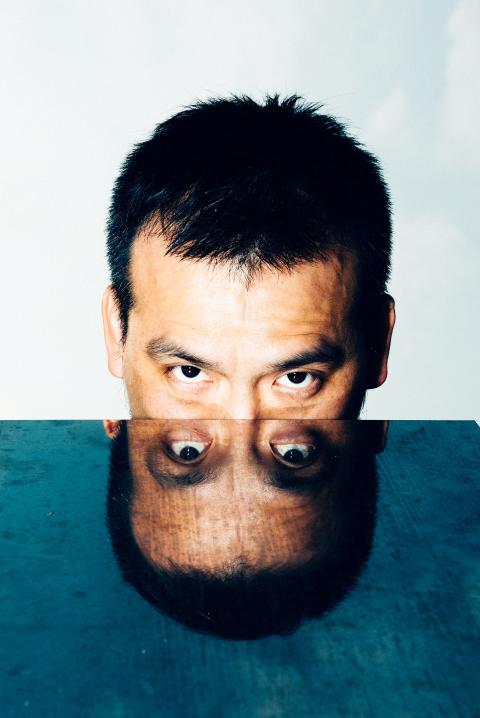Now that the National Theater Concert Hall’s (NTCH) Taiwan International Festival of Art is winding down, with just two programs left in the series, Anne Teresa De Keersmaeker’s company Rosas this week and Toneelgroep Amsterdam’s production of The Fountainhead at the end of the month, its Innovation Series is set to launch.
The deft touch of the NTCH’s programmers is evident with yet another well-curated series of theater and dance that mixes local artists and foreign performers, contemporary and classic forms and some shows that sell out weeks ahead of time.
In fact, the first two programs in the series, both theater pieces based on prominent English playwrights’ works, have sold out: Wang Chia-ming’s (王嘉明) Blood and Rose Band (血與玫瑰樂隊), an examination of William Shakespeare’s historical plays and England’s War of the Roses as seen from the perspective of a disc jockey, and Malaysian-born Koh Choon Eiow’s (高俊耀) Outsider (親密), based on the works of Harold Pinter.

Photo Courtesy of National Theater Concert Hall
The third drama piece, Li Ming-chen’s (李銘宸) Golds: The Night in Front of the Forest (戈爾德思:夜晚就在森林前方), which opens on June 9, is based on French playwright Bernard-Marie Koltes’ 1977 monologue La Nuit juste avant les Foret, about the struggles of immigrant workers trying to survive in their new societies.
The first of the three dance programs in the series opens on June 2: Taiwan Dance Scene-Mixed Program. It will showcase works by Lin Yu-ju (林祐如), Chen Wu-kang (陳武康) and Liu Yan-cheng (劉彥成), which all deal in some way with metamorphosis.
On June 23, Terrace on the Hill (尋,山裡的祖居所), a coproduction by the TAI Body Theatre (身體劇場與羅蘭) and French percussionist Roland Auzet opens. The five-year-old company, founded by Watan Tusi, a Truku, includes members of the Truku, Paiwan and Puyuma communities from eastern Taiwan.

Photo Courtesy of National Theater Concert Hall
The show is about sharing stories of the past and searching for meaning in the future.
The EkosDance Company from Indonesia will close out the dance section of the Innovation Series with two works by founder and choreographer Eko Supriyanto, Crying Jay Lolo and Balabala, beginning on July 14.
Supriyanto, who is an expert in traditional Indonesian court dances, examines contemporary issues and challenges societal assumptions.
Cry Jailolo is about the risks of overdevelopment and the threat to the world’s oceans, while Balabala takes war dances that are usually performed by men and has women dance them.
The ticket prices for the Innovation Series range from NT$700 to NT$900 and are available at the NTCH box offices, online at www.artsticket.com.tw or at convenience store ticket kiosks.
There is also a music portion to the series, but it does not start until September and tickets are not yet on sale. It will feature an international orchestra’s look at Central Asia’s “new language” and a contemporary musical theater production.
As for the Rosas program mentioned at the top of this article, the Belgium-based company has brought two productions to Taipei on its third visit: Vortex Temporum and Fase. There are just a handful of tickets left for Vortex Temporum tonight, while Fase, which was De Keersmaeker’s first creation, is sold out.
Vortex Temporum features seven dancers and seven musicians from the Belgian music ensemble Ictus and was inspired by a work by contemporary French composer Gerard Grisey. The work visualizes polyphonic music by paring a dancer to a musician and creating movement befitting the instrument being played.

One of the biggest sore spots in Taiwan’s historical friendship with the US came in 1979 when US president Jimmy Carter broke off formal diplomatic relations with Taiwan’s Republic of China (ROC) government so that the US could establish relations with the People’s Republic of China (PRC). Taiwan’s derecognition came purely at China’s insistence, and the US took the deal. Retired American diplomat John Tkacik, who for almost decade surrounding that schism, from 1974 to 1982, worked in embassies in Taipei and Beijing and at the Taiwan Desk in Washington DC, recently argued in the Taipei Times that “President Carter’s derecognition

JUNE 30 to JULY 6 After being routed by the Japanese in the bloody battle of Baguashan (八卦山), Hsu Hsiang (徐驤) and a handful of surviving Hakka fighters sped toward Tainan. There, he would meet with Liu Yung-fu (劉永福), leader of the Black Flag Army who had assumed control of the resisting Republic of Formosa after its president and vice-president fled to China. Hsu, who had been fighting non-stop for over two months from Taoyuan to Changhua, was reportedly injured and exhausted. As the story goes, Liu advised that Hsu take shelter in China to recover and regroup, but Hsu steadfastly

You can tell a lot about a generation from the contents of their cool box: nowadays the barbecue ice bucket is likely to be filled with hard seltzers, non-alcoholic beers and fluorescent BuzzBallz — a particular favorite among Gen Z. Two decades ago, it was WKD, Bacardi Breezers and the odd Smirnoff Ice bobbing in a puddle of melted ice. And while nostalgia may have brought back some alcopops, the new wave of ready-to-drink (RTD) options look and taste noticeably different. It is not just the drinks that have changed, but drinking habits too, driven in part by more health-conscious consumers and

On Sunday, President William Lai (賴清德) delivered a strategically brilliant speech. It was the first of his “Ten Lectures on National Unity,” (團結國家十講) focusing on the topic of “nation.” Though it has been eclipsed — much to the relief of the opposing Chinese Nationalist Party (KMT) and Taiwan People’s Party (TPP) — by an ill-advised statement in the second speech of the series, the days following Lai’s first speech were illuminating on many fronts, both domestic and internationally, in highlighting the multi-layered success of Lai’s strategic move. “OF COURSE TAIWAN IS A COUNTRY” Never before has a Taiwanese president devoted an entire speech to